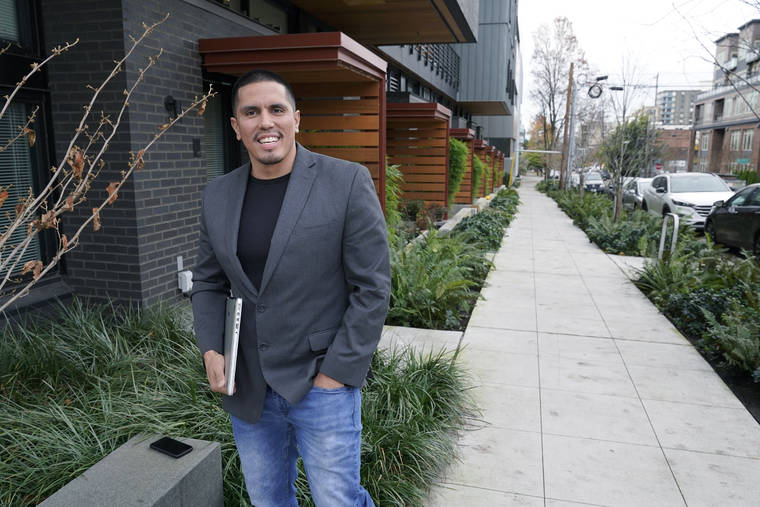SEATTLE — As a young man Victor Sauceda didn’t care about who was president, about who was governor, about voting at all. He wasn’t living by the law anyway.
But after serving eight years in prison for burglary and fencing stolen property, during which he learned computer coding and had a political awakening, he cares. And cases like his have prompted advocates in Washington to redouble their efforts to restore voting rights to people who are out on community supervision after serving prison time, as California voters did during last month’s election.
“It really does something to me mentally that I don’t have the power to vote,” Sauceda said. “We served our prison term when we were incarcerated. For society to reject us right when we come out, to say you’re not good enough to vote, it’s not a good feeling.”
Washington has been a leader in other efforts to expand the franchise. It’s one of just five states with universal vote-by-mail. Last year, it began allowing 16- and 17-year-olds to pre-register to vote, allowing citizens to register as late as Election Day and automatically registering citizens to vote when they interact with state agencies.
But unlike 19 other states, Washington does not allow people convicted of many felonies to vote while they’re out of prison but still under Department of Corrections supervision — a period that can last up to three years for violent crimes, during which they often live with friends or family, hold jobs, and check in regularly with a parole officer. Instead, their voting rights are restored when they’ve completed their time in custody and on supervision.
Despite support from the Department of Corrections, the Washington Association of Prosecuting Attorneys and the Attorney General’s Office, a Democrat-sponsored bill to let people vote while on parole stalled in the state Senate early this year in light of opposition from Republicans who wanted to exempt people convicted of certain crimes, including gang-related gun charges and assaults on police.
Sean Morales-Doyle, deputy director of the Brennan Center for Justice at New York University Law, said momentum is building for the legislative session that begins in January.
Colorado, Nevada and New Jersey passed measures in 2019, and California voters approved a constitutional amendment, Proposition 17, in November to automatically restore voting rights to people on parole.
New York, Connecticut and New Mexico are other states that activists are targeting for the change. In New York, tens of thousands of people on parole have received pardons that restored their voting rights under a 2018 executive order by Gov. Andrew Cuomo, even though state law otherwise bars those on parole from voting.
Maine and Vermont are the only states that allow felons to vote while incarcerated, an approach voters in Washington, D.C., also adopted this year.
“The purpose of community supervision is rehabilitation and reintegration, to help people return to their communities in a healthy way,” Morales-Doyle said. “Restoring voting rights supports that goal.”
Among the Washington lawmakers pressing the issue is Rep. Tarra Simmons, D-Bremerton, who last month became what is believed to be the first formerly incarcerated person elected to the Statehouse.
Simmons was convicted of assault in 2001 and of drug and theft charges in 2011, after her father’s death sent her into a battle with methamphetamine. After being released in 2013, she went to law school and won approval from the Washington Supreme Court to take the bar exam despite her past.
“Voting rights disenfranchisement is really tied to racial injustice, to using criminal record as a proxy for race,” Simmons said, crediting local activists including the Washington Voting Rights Restoration Coalition with continuing to work with lawmakers after the measure stalled. “There is no public safety risk in having people vote. This encourages successful re-entry. It’s a win for everybody.”
Republican Sen. Mike Padden of Spokane Valley, however, doesn’t see it that way. He called it an insult to crime victims and noted that if the recently incarcerated want to get involved politically they can volunteer on campaigns.
“The whole idea is they should pay their debt to society before they regain the right to vote,” Padden said.
There are about 10,000 people on community supervision in Washington who aren’t able to vote, according to the Brennan Center.
Sauceda has been involved in the criminal justice system since he was 14. He’s now 31, living in Seattle and working with the nonprofit Code For America to create an app for Santa Barbara County, California, to link newly released inmates with food, housing, job resources and other services.
His 18-month stint on parole ends next spring. He looks forward to filling out his first ballot.
“I don’t really know because I’ve never voted, but I think it would give me more of a sense of belonging to the community,” Sauceda said.


